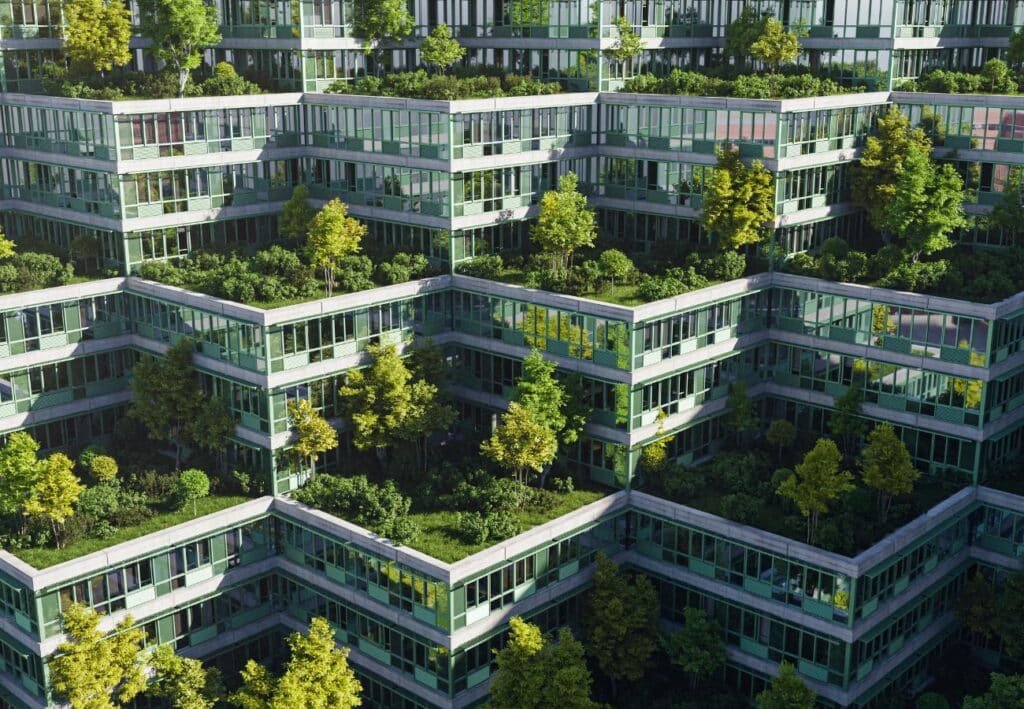When managing a property in New York City, the roof over your head is more than just a protective cover. It’s an essential piece of infrastructure that affects everything from energy efficiency to maintenance costs. Whether you’re constructing a new building or replacing an old roof, understanding the types of commercial roofing in NYC is critical for making the right choice.
This guide will walk you through the different types of commercial roofs, key factors to consider, and the specific regulations in NYC to help you make an informed decision.
Types of Commercial Roofing
Choosing a commercial roof in NYC means weighing various options that suit the city’s climate, building requirements, and architectural needs. Below are some common types of commercial building roofs you’ll find in NYC.
1. Flat Roofs

Flat roofs are one of the most common types of roofs on commercial buildings in NYC. Popular for their simplicity and cost-effectiveness, these roofs provide a level surface that supports HVAC systems, solar panels, or even a rooftop garden.
Advantages:
- More affordable than other roof types.
- Easier to install and maintain.
- Space can be utilized for additional functions, such as storage or recreational areas.
Disadvantages:
- Requires frequent maintenance to avoid water pooling and leaks.
- Shorter lifespan compared to pitched or metal roofs.
Best Suitable For: Buildings requiring rooftop equipment or installations.
2. Metal Roofs

Metal roofs provide excellent durability and are becoming increasingly popular for their modern look and long-term savings. Constructed with materials like aluminum, steel, or copper, metal roofs are built to withstand harsh weather conditions.
Advantages:
- Extremely durable and can last up to 50 years or more.
- Highly resistant to wind, fire, and impact damage.
- Reflective surface helps reduce cooling costs in the summer.
Disadvantages:
- Higher upfront cost compared to other types of commercial roofs.
- Can be noisy during heavy rain unless insulated properly.
Best Suitable For: Modern office buildings and industrial facilities.
3. Green Roofs

Green roofs are an eco-friendly option that’s growing in popularity, especially in urban areas like NYC where sustainability is a priority. With layers that support soil and plant life, they offer more than just aesthetic appeal.
Advantages:
- Improved insulation, reducing energy costs year-round.
- Helps manage stormwater, reducing strain on city sewer systems.
- Extends the lifespan of the roof by protecting it from UV radiation and temperature fluctuations.
Disadvantages:
- Higher installation costs due to additional structural requirements.
- Requires ongoing maintenance to care for the vegetation.
Best Suitable For: Environmentally-conscious businesses or buildings with heavy energy usage.
4. PVC and TPO Roofing

PVC (Polyvinyl Chloride) and TPO (Thermoplastic Polyolefin) roofing systems are single-ply membranes commonly used in commercial roofing. They are lightweight, durable, and ideal for flat roofs.
Advantages:
- Resistant to chemicals, UV rays, and punctures.
- Energy-efficient with reflective surfaces that minimize heat absorption.
- Requires minimal maintenance.
Disadvantages:
- Higher upfront costs compared to traditional asphalt roofs.
- Potential for seam weakening over time if not installed correctly.
Best Suitable For: Commercial properties seeking energy-efficient, low-maintenance roofing solutions.
Factors to Consider When Choosing a Commercial Roof
When deciding on the types of commercial building roofs, several factors can influence your choice.
1. Cost
While green roofs and metal options are more expensive upfront, they often pay off in the long run with lower energy costs and durability. Flat roofs and built-up roofs (BUR) are more affordable at installation but may incur higher maintenance expenses over time.
2. Durability and Lifespan
Durability varies across different types of commercial roofs. For instance, a TPO roof may last around 20 years, whereas metal roofing could exceed 50 years. Evaluate your priorities, including long-term maintenance costs, before making a decision.
3. Weather Resistance
NYC experiences a mix of weather, from wet springs to snowy winters. Your roof must withstand diverse conditions. Metal roofs offer superior weather resistance, while PVC and TPO roofs excel in heat reflection.
4. Energy Efficiency
Energy costs in NYC can be high, so opting for energy-efficient roofing like reflective TPO, PVC systems, or green roofs can significantly reduce utility bills.
5. Sustainability
Many NYC property owners are turning to sustainable roofing practices. Green roofs, made of living plants, and cool roofing options, like PVC, are great ways to meet NYC’s energy efficiency and environmental goals.
NYC-Specific Regulations
Navigating local regulations and building codes is key to ensuring your roof meets NYC requirements. Here are some highlights to keep in mind when planning your roofing project in the city.
- Energy Codes: NYC’s Energy Conservation Code (NYCECC) mandates minimum energy performance standards. Cool roofs and roofs with proper insulation help meet these requirements.
- Stormwater Management: Green roofs and other water retention systems can help properties comply with NYC’s stormwater management regulations.
- Permits: Any commercial roofing work in NYC typically requires building permits, so work with a licensed contractor familiar with local rules.
Partnering with a professional like Brick Tech Contracting Corp ensures compliance with all your roofing needs.
Why the Right Commercial Roof Matters
The roof is one of the most critical investments for any commercial property owner. It protects your building, boosts energy efficiency, and contributes to the aesthetic and functional value of the property. Whether you’re drawn to the practicality of flat roofs, the longevity of metal roofs, or the sustainability of green roofs, selecting the right roofing type can make all the difference.
If you’re ready to explore which option is best for your property or need expert guidance, get in touch with Brick Tech Contracting Corp. With years of experience in commercial roofing in NYC, they’re a trusted partner for countless property owners across the city.








